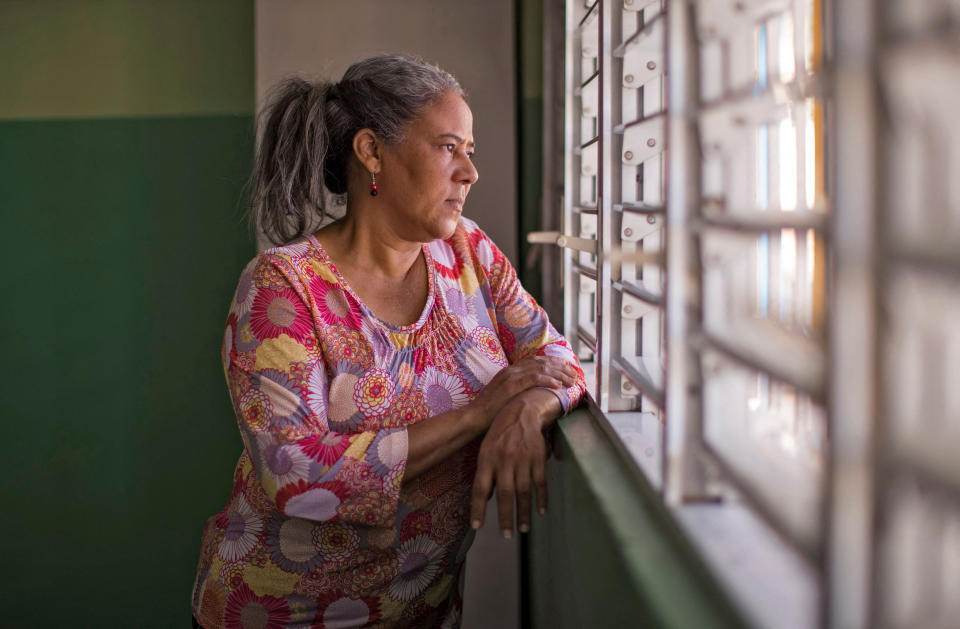Mom fighting abortion bans after her daughter's death points to her homeland as a cautionary tale
On the eve of the anniversary of her daughter's death Tuesday night, Rosa Hernández was having trouble falling asleep. She said she could still feel the presence of her 16-year-old child Rosaura "Esperancita" Almonte Hernández, who died a decade ago when she had leukemia. Doctors had delayed giving Rosaura chemotherapy because she was pregnant, and they didn't want to harm the fetus.
"I stayed up thinking about how I used to care for her and the meals I used to cook for her," Hernández told NBC News in Spanish from her home in the Dominican Republic, one of two dozen nations in the world with a ban on abortions under all circumstances, even when a woman’s life is at risk.
"Abortion bans go against health," Hernández said. "What happened to my daughter can now happen in the United States" after the Supreme Court overturned Roe v. Wade and opened the door for states to outlaw abortions. "This is monstrous."
Ten years since Rosaura's death, Hernández has embarked on a fight to seek justice for her only child, change abortion laws in her country and warn others about the deadly consequences of abortion bans.
On July 2, 2012, Hernández took Rosaura to a public hospital with a high fever, extreme weakness and bruises. The teen was diagnosed with acute lymphoblastic leukemia, a type of cancer common among children that tends to progress quickly. If untreated, it can kill patients in just a few months. Around the same time, medics learned Rosaura was about a month pregnant.

According to a petition filed with the Inter-American Commission on Human Rights by Hernández and her legal representatives, a doctor recommended Rosaura be administered medication to end her pregnancy before receiving chemotherapy, but hospital staff refused to do so. The staff also refrained from providing the chemotherapy Rosaura required until almost three weeks later, so as to not affect a critical period of the fetal gestation.
Through the petition, Hernández and her legal team are urging government officials in the Dominican Republic to assume responsibility over Rosaura's death.
With Rosaura's health rapidly deteriorating, medical staff decided to start Rosaura's chemotherapy on July 26, 2012, without interrupting her pregnancy, according to Women’s Link Worldwide, an international nonprofit organization that has been providing Hernández with legal representation.
But the teen died of a hemorrhage on Aug. 17, 2012.
"My country did this to me," Hernández said. "They destroyed my daughter and violated her rights."
With treatment, long-term survival rates for childhood acute lymphoblastic leukemia patients is close to 90%, according to a study published in the Journal of Clinical Oncology.
Hernández has sued multiple health professionals involved in her daughter's case as well as the Dominican Ministry of Health.
Since Rosaura's death, other Dominican families say they have faced the pain of losing a loved one for not having access to a lifesaving abortion.
Some of those families came together Wednesday to help reignite the fight against the Dominican Republic’s total abortion ban that started last year after President Luis Abinader walked back on a campaign promise to decriminalize abortion under specific circumstances.

Several organizations and social groups gathered in front of the National Congress to commemorate the 10th anniversary of Rosaura’s death, remember the women who have died after being unable to end their pregnancies and renew pressure to change the laws through their movement #LasCausalesVan, Spanish for “the causes go.”
#LasCausalesVan refers to the three circumstances in which advocates believe abortion should be decriminalized in the Dominican Republic: when a woman’s life is in danger, when a pregnancy is not viable, and in cases of rape or incest.
“The three causes are to save lives,” Hernández said.
'There are many Rosauras out there'
In the same year Rosaura died, Damaris Mejía died of an infection caused by a dead fetus lodged in her uterus, according to reproductive rights activists in the Dominican Republic.
Mejía, a mother of two, was pregnant with her third child when she went to the hospital after starting to lose amniotic fluid. She had lost so much fluid that the unborn baby would likely die, hospital staff told Mejía, according to her sister Juliana, the #LasCausalesVan campaign tweeted. She was sent home with some medications.
After her condition worsened, Mejía went to another hospital where she was told nothing could be done for her because they were not allowed by law to extract the fetus, the campaign tweeted. The doctor was unwilling to take the risk and potentially lose her ability to practice medicine, according to Mejía's sister, per the campaign. Mejía died at home four days later, leaving her two children behind, the family said.
In the U.S., a 26-year-old pregnant woman in Texas went through a similar risk after the state started enforcing a new law banning all abortions after fetal cardiac activity is detected, which usually happens at about six weeks of pregnancy.
Elizabeth Weller had experienced a premature rupture of membranes, leaving her with "very little amniotic fluid," she said in an interview with NPR. No amniotic fluid at 18 weeks pregnant meant Weller and the fetus were highly vulnerable to chorioamnionitis, a uterine infection. Additionally, the chances of the fetus surviving at such an early stage were extremely slim, but doctors couldn't terminate her pregnancy until the fetal heartbeat stopped, Weller said.
In the meantime, she was enduring cramps, passing clots of blood and having smelly yellow discharge. But hospital staff said her symptoms were not indicative of a severe enough infection to justify her pregnancy's termination, NPR reported. A few days later, after her symptoms worsened, an ethics panel determined Weller could undergo a stillborn delivery at the hospital.
In the Dominican Republic, other families who lost relatives to pregnancy complications joined Hernández outside Congress to press on the urgency around changing the law.

Diógenes Martínez, the father of Carmen Dionelys Martínez Bonilla, told a local Dominican newspaper his daughter, who had sickle cell disease, died of preventable pregnancy complications due to her condition. Activists believe doctors could have saved her life if they were able to terminate her high-risk pregnancy.
Another mother forced to endure a unviable pregnancy for seven months, Winifer Nuñez Beato, died last year following severe blood loss. Nuñez Beato had a placenta condition that kept her on medical leave for most of her pregnancy to prevent significant bleeding or a premature birth, her widower, Leonel Rodriguez, told local media.
The family believes her death was avoidable since doctors had already warned Nuñez Beato of the risks during her second month of pregnancy. They asked three doctors to help terminate her pregnancy, but they all refused, Diario Libre reported. Nuñez Beato was a mother to a 2-year-old girl at the time of her death.
“I try to live to bring my voice to the world because this cannot stay like this,” Hernández said. “There are many Rosauras out there.”
Hernández, a single mother, said she raised Rosaura to be a free woman "who was beautiful inside and out."
"I can't think of a single person who didn't cry over Rosaura's death," Hernández recalled, adding that her daughter had a lot of friends.
In the U.S., Roe’s repeal opened the door for 10 states to implement abortion bans. Five states have restricted access to abortions but haven’t banned the procedure, and seven states have pending bans that could go into effect later in the year. Abortion remains legal in the other 28 states.
In the Dominican Republic, congressional legislation to create a new penal code and change the total ban on abortion has been stalled for decades. Activists say women resort to clandestine abortions, which puts more of them at risk. They point to Latin American countries such as Colombia, Argentina and parts of Mexico that have recently legalized abortions.
After her daughter's death, "my whole family was destroyed," Hernández said. "But now, I just have to fight harder."
Follow NBC Latino on Facebook, Twitter and Instagram.

